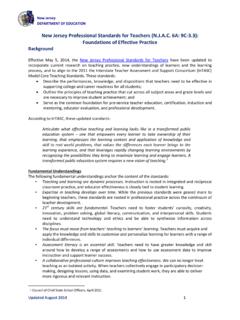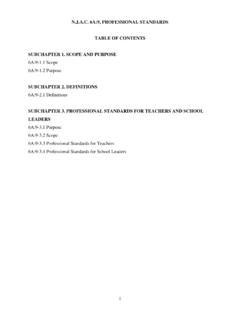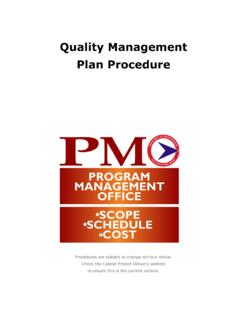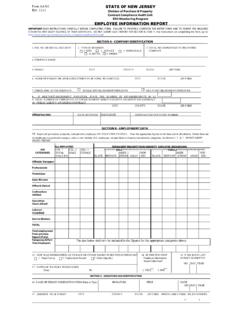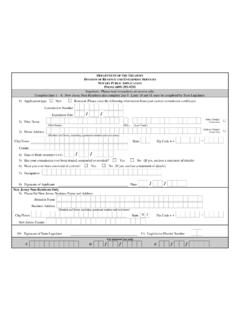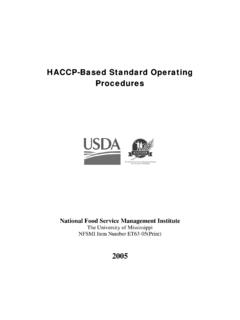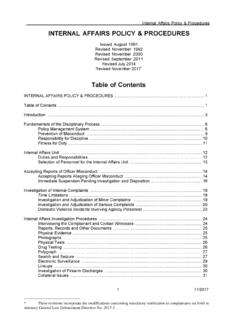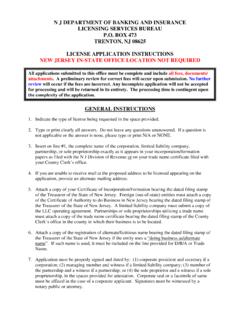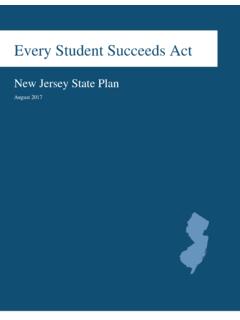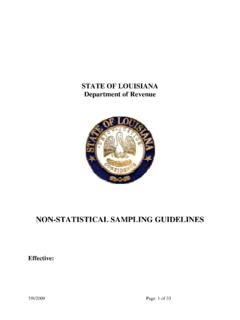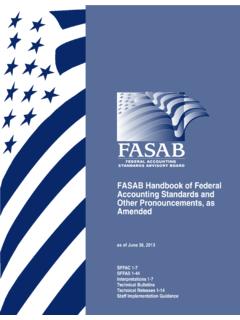Transcription of SUBCHAPTER 7. ACCOUNTING AND AUDITING
1 NEW JERSEY ADMINISTRATIVE CODE SUBCHAPTER 7. ACCOUNTING AND AUDITING 5 ACCOUNTING and financial reporting systems (a) The ACCOUNTING system consists of the methods and records established to identify, assemble, analyze, classify, record, and report an entity's transactions and to maintain accountability for the related assets and liabilities. (b) An effective ACCOUNTING system shall include a double-entry ACCOUNTING for all transactions resulting in a general ledger, which shall be required for all authorities and special districts. (c) Any ACCOUNTING system adopted pursuant to (a) and (b) above must make it possible to present fairly and with full disclosure the financial position and results of financial operations of the funds and account groups of the reporting entity, in conformity with generally accepted ACCOUNTING principles (GAAP) as promulgated by the Governmental ACCOUNTING standards Board (GASB), 401 Merritt 7, Box 5116, Norwalk, CT 06856-5116, incorporated herein by reference, as may be amended from time to time, and demonstrate compliance with finance-related legal and contractual provisions, including applicable security and financing agreements.
2 (d) GAAP as it applies to proprietary funds of state and local governments, specifically as it applies to enterprise funds shall be used to account for an authority's ongoing activities, similar to those found in the private sector, where the intent of the governing body is that the costs (expenses, including depreciation) of providing services to the general public on a continuing basis be financed or recovered primarily through user charges and/or where the governing body has decided that periodic determination of revenue earned, expenses incurred, and/or net income is appropriate for capital maintenance, public policy, management control, accountability or other purposes.
3 (e) The financial statements of authorities shall be prepared in accordance with GAAP applicable to enterprise funds. Accordingly, revenues and expenses shall be recognized on the accrual basis. Revenues shall be recognized in the ACCOUNTING period in which they are earned and become measurable; expenses shall be recognized in the period incurred, if measurable. (f) The financial statements of special districts shall be prepared in accordance with GAAP applicable to governmental funds of state and local governments. Accordingly, revenues and expenditures shall be recognized on the modified accrual basis. Revenues shall be recognized in the ACCOUNTING period in which they become available and measurable.
4 Expenditures shall be recognized in the ACCOUNTING period in which the fund liability is incurred, if measurable, except for unmatured interest on general long-term debt, which shall be recognized when due. Page 1 NEW JERSEY ADMINISTRATIVE CODE 5 Establishment of an internal control structure (a) The governing body of each authority and special district is responsible for establishing and maintaining an internal control structure. An entity's internal control structure shall consist of policies and procedures established to provide reasonable assurance that specific entity objectives and proper conduct of the entity's business with full accountability for the resources made available, shall be achieved.
5 In fulfilling this responsibility, estimates and judgments by the governing body are required to assess the expected benefits and related costs of internal control structure policies and procedures. (b) The objectives of an internal control structure should provide the governing body with reasonable, but not necessarily absolute, assurance that assets are safeguarded against loss from unauthorized use or disposition, and that transactions are executed in accordance with the respective governing body's authorization and recorded properly to permit the preparation of financial statements in accordance with GAAP. 5 Determining the financial reporting entity The definition of a financial reporting entity shall be based on the concept of financial accountability.
6 A primary objective of authorities' and special districts' financial reporting should be to provide users of financial statements with a basis for assessing the accountability of their respective elected/appointed officials, responsible for the operations of their specially created organizations. The financial statements of the reporting entity shall provide for distinguishing between the following: primary government, component unit, joint venture, jointly governed organization, or another stand- alone government, by communicating such information to the users thereof. Such selection of the financial reporting entity shall be made by the governing body pursuant to GAAP criteria and be presented in the entity's financial statements pursuant to GAAP reporting standards .
7 5 Interim financial reporting For both authorities and special districts, interim financial reports should be comprised principally of statements that reflect current financial position at the end of a month or quarter and compare actual financial results with budgetary estimates and limitations. Appropriate interim financial statements and reports of financial position, operating results, and other pertinent information should be prepared primarily for purposes of governing body control of financial operations, facilitate regulatory budgetary oversight, and where necessary for external reporting purposes. All such interim reports need not be prepared on a GAAP basis, unless internally required, but all such reports may be subject to audit pursuant to 40A:5A-15.
8 Page 2 NEW JERSEY ADMINISTRATIVE CODE 5 Compliance with legal provisions generally both authorities and special districts are required to follow the applicable provisions of statute and at times such legal provisions may conflict with GAAP. Conflicts between legal provisions and GAAP do not require maintaining two ACCOUNTING systems. Instead, the ACCOUNTING system can be maintained on a legal compliance basis, but should include sufficient additional information to permit GAAP based reporting. Specifically, authorities and special districts both have a prescribed budgetary basis to demonstrate legal compliance; notwithstanding, sufficient supplemental records shall be kept to permit presentation of financial statements in conformity with GAAP.
9 5 AUDITING procedures and scope (a) Each authority and special district shall conduct an annual audit for their respective fiscal year in accordance with: generally accepted AUDITING standards (GAAS), as promulgated by the American Institute of Certified Public Accountants (AICPA), Harborside Financial Center, 201 Plaza Three, Jersey City, NJ 07311-3881, incorporated herein by reference, as may be amended from time to time; Government AUDITING standards (often called the Yellow Book, General accepted Government AUDITING standards , or GAGAS) issued by the Comptroller General of the United States and the United States General ACCOUNTING Office (GAO) at the United States General ACCOUNTING Office, Washington, 20548, and those audit standards having been adopted as rules by the Local Finance Board and the Division of Local Government Services, Department of Community Affairs, State of New Jersey.
10 Those standards require that an independent auditor plan and perform an audit to obtain reasonable assurance that the financial statements of the reporting entity are free of material misstatement. These basic financial statements shall include, but not be limited to: a balance sheet and the related statements of revenues, expenses/expenditures and changes in retained earnings/fund balance and cash flows for the year then ended. Notwithstanding that such statements presented are the responsibility of the respective governing bodies involved, the independent auditor engaged to perform the audit, shall express an opinion on the financial statements taken as a whole. (b) Any audit performed pursuant to (a) above must include examining on a test basis and evidence supporting the amounts and disclosures in the financial statements.
